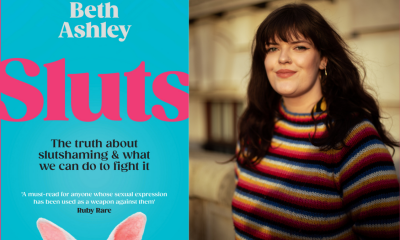Entertainment
‘How To Have Sex’ exposes the grim gender gap for virginity, sex, and the teen holiday experience

Content warning: This feature discusses sexual assault.
It was meant to be the “greatest holiday ever” but it ended up being a euphoric yet devastating life lesson.
Molly Manning Walker’s Cannes Film Festival breakout How To Have Sex takes audiences on a sizzling, searing journey to Malia, Crete, on a tumultuous girls trip. Three teenage greatest friends Tara (Mia McKenna-Bruce), Skye (Lara Peake), and Em (Enva Lewis) have finished their exams and are taking the Cretan town by storm in a blur of hedonism and newfound independence. But what ensues amongst the fish bowl cocktails and sticky nightclub anthems is a tussle with toxic friendships and the nuances of sexual assault and consent. At its core, the film weaves a dark but important tale of female sexuality and pressure.
How To Have Sex encourages post-watch conversations about problematic gender and sexual dynamics, particularly for young people. Walker’s film highlights the harsh contrast between the perceived experience of the “lads” and “girls” holidays, and how they are both portrayed in popular British culture. As a rite of passage, it is known as a trip taken by young women and men during school or college age – often a first solo trip abroad, even more often an excuse to blow off steam, party and experiment sexually.

Em (Enva Lewis) and Tara (Mia McKenna-Bruce).
Credit: Film4
When we watch films about “lads holidays” — think The Inbetweeners, American Pie, The Hangover, 22 Jump Street — they’re mostly lighthearted stories of young men on their quest to “get laid”, an experience, for better or worse, that’s often trivialised in comparison to the darker undertones of How To Have Sex and its female leads’ experiences.
The film is a chilling revelation of how sexual pressures can manifest differently for men and women — pop culture represents men having a laugh as they navigate their sexuality, while women are often put in danger. This portrayal is not an accident — it reflects the dark side of this journey for women. One in 16 U.S. women experienced forced or coerced intercourse as their first sexual experience in their early teens, according to a study, while a U.N. Women UK investigation found that 97 percent of women aged 18-24 have been sexually harassed.
How to Have Sex highlights the gender gap in terms of early sexual experiences

Skye (Lara Peake), Em (Enva Lewis), and Tara (Mia McKenna-Bruce).
Credit: Film4
For sexologist and relationship therapist Madalaine Munro, this highlights a gender gap when it comes to inherent safety within early sexual experiences, and how it has become normalised. Clinical psychologist Dr. Sarah Bishop adds that the lighter portrayal of male sexual experiences “trivialises male sexual exploration, often without addressing the consequences or complexities involved.”
Walker’s research while making the film revealed surprising attitudes towards consent and sexual assault in younger generations. In an interview with Empire, she described “mind-blowing” pre-shoot workshops with teens during which some girls expressed views that veered towards victim blaming. When the production team asked their focus group to read a scene of sexual assault from the film, “they’d be like, ‘I don’t see any issues with this scene,'” Walker said, with one participant saying: “Girls have to wear better clothes. They have to protect themselves and not get drunk.” Victim blaming aside, it’s clear that young women are absorbing societal messages that the onus of preventing sexual assault falls to those most vulnerable.
Conversations need to be had about the dangerous consequences of victim blaming, particularly amongst women in female friendship groups.
The director described How To Have Sex as “the sort of film we need right now… one we’ve needed for a long, long time”. Conversations need to be had about the dangerous consequences of victim blaming, particularly amongst women in female friendship groups.
“When society teaches women to be competitive, dismissive, and weary of each other it adds to the lack of safety each woman inherently feels,” Munro explains. “It also creates a subtle narrative for women normalising mistreatment — that it is OK to be treated poorly by both men and women. This makes violence against women more dangerous because they feel isolated in it, and they can’t trust others for support while going through traumatic events.”
The film navigates the nuances of consent onscreen

Credit: Film4
The film also dives deep into the nuances of consent, as protagonist Mia (played to perfection by McKenna-Bruce) encounters multiple sexual assaults from a “lad” her friends meet and party with on the Malia strip, Paddy (Samuel Bottomley). She’s depicted saying “no” repeatedly, then “yes” in one instance, with clear negative and uncomfortable body language throughout all of the interactions, causing the viewer to think deeply about what consent truly is, and how it cannot be binary and must be continuous. More than that, consent can be withdrawn at any stage – and Tara’s experience onscreen brings attention to this often overlooked fact. Here, we see that “giving in” and saying “yes” after saying “no” repeatedly beforehand does not necessarily count as consent.
“We are witnessing a transition where consent wasn’t spoken about in the mainstream perhaps a decade ago, so as a society we are catching up with learning about consent,” Munro says. “For many, nuances in consent may be deeply misunderstood because we are living within an infrastructure which wasn’t built to recognise them.” She adds that “consent education at schools is so important, to help children and teenagers understand how to determine their own yes or no, and also how to process someone else’s no.”
“For many, nuances in consent may be deeply misunderstood because we are living within an infrastructure which wasn’t built to recognise them.”
The pressures around damaging trivialisation of “virginity” is also explored, with Tara’s friend Skye threatening to out her sexual inexperience in a game of Never Have I Ever. She tells Tara, “if you don’t get laid this holiday, you never will,” perfectly demonstrating the toxic competitive element of sexual discovery and experimentation, and how peer pressure influences and exacerbates it. It brings attention to how problematic “virginity” is as a concept – after all, it exists as a socially constructed idea within a patriarchal structure to devalue women, including Tara and her friends.
It encapsulates the onus that is applied to one’s first sexual experience, and the way this can warp our expectations to a dangerous degree. Bishop advises that discussions around virginity need to shift from judgement and shame to one that focuses on “personal choice and autonomy”, adding that stories onscreen should depict “a range of experiences and challenge stereotypes”, leading us to a more realistic and inclusive portrayal of virginity. This should help to dismantle harmful narratives, but before these conversations can shift, the negative nature of the status quo has to be highlighted.

Credit: Film4
In the aftermath of her sexual assault, we see Tara operate in silence, unable to put into words what happened to her. She speaks of how “strong” Paddy is, how he “knew what he was doing”, but the vocabulary of assault is never used. It’s a heartbreaking example of the need for better education around this subject, so that young people, whether they are victims or not, can express themselves about and call out this behaviour.
“From a psychological perspective, sex education is vital to help people develop the emotional and cognitive skills necessary for understanding consent, building healthy relationships, and reducing the stigma around the issues,” Bishop says, adding that a lack of education increases the likelihood of assaults occurring due to people being unaware of what constitutes sexual violence and abusive behaviour.
“For some women, this behaviour can be so normalised that they may not even realise that it is abuse until they see it on the screen.”
Munro adds that this silence and lack of communication after assault is part of a larger picture that involves lack of barriers to resources for victims – government research in January 2023 saw a reduction in conviction rates across domestic abuse (2.1 percent) and rape (7.2 percent). As well as pushing, campaigning and insisting on better sex education, instigating these important conversations through film, TV and other mediums is crucial.
“When consent and violence is portrayed on screen, it can give a voice to women who may not feel they have one. It may help them to understand the impact of what they have been through in a more accessible way,” Munro says.
“For some women, this behaviour can be so normalised that they may not even realise that it is abuse until they see it on the screen.”
How to Have Sex makes plain the importance of men holding other men responsible

Badger (Shaun Thomas).
Credit: Film4
Another huge vehicle for change when it comes to sexual assault and violence against women is exploring how men can help in preventing and challenging it – and How To Have Sex depicts this important issue perfectly. Alongside Paddy, we have the dubiously named Badger (played by Shaun Thomas), who forms his own friendship with Tara and clearly holds suspicions about potential sinister behaviour from his mate. But, significantly, he says nothing to try and stop it. He comforts Tara, sure, with weak comments about how long he’s known his friend — as if friendship duration negates the damage and his complicity.
Tackling this tricky dynamic, and the importance of men holding other men responsible for their actions, is one of the film’s biggest achievements.
“Engaging men and boys is very much part of the solution to ending male violence against women and girls,” Rebecca Hitchen, head of policy and campaigns at the End Violence Against Women Coalition tells Mashable. “Women consistently say they want men to call out unacceptable views and behaviour amongst their peer groups, and to be helpful bystanders. This means naming problematic behaviour when you see it, confronting your own ideas about masculinity and sometimes intervening in harassment and assault in safe ways.”
Munro insists that portraying the impact of men not holding other men accountable on screen is important, showing the impact of enabling and perpetuating abuse. “The standard of what is socially acceptable then changes, as we see with outdated perceptions of consent, abuse and violence,” she says.
Tackling this tricky dynamic, and the importance of men holding other men responsible for their actions, is one of the film’s biggest achievements.
One of Walker’s core missions with How To Have Sex was to shine a light on the “gap in education around consent” – she has done this and more, isolating shadowy corners of sexuality and holding them to the light. Munro calls films like this “pivotal for bringing conversations around consent and sexual pressures forward”.
“When we look at old romantic comedies, some of the behaviour normalises nonconsensual, harmful behaviour,” she says. “So films and stories that discuss consent and sexual challenges can help people to identify things that we relate to but may not have words for.”
Hitchen adds: “We’re still a long way from shifting public attitudes to sex, and it’s crucial that this is tackled not only through education and public campaigns, but in popular culture like films, TV shows, books, the media and beyond, which drives a crucial part of what we find acceptable and how we collectively think and behave.”
How To Have Sex, and films like it past and present, can stand strong alongside other campaign methods to change how we speak about sexuality and assault, and how they are navigated in the future.
How To Have Sex is now showing in cinemas.
If you have experienced sexual abuse, call the free, confidential National Sexual Assault hotline at 1-800-656-HOPE (4673), or access the 24-7 help online by visiting online.rainn.org.
Topics
Sex
Sex & Relationships
-

 Entertainment5 days ago
Entertainment5 days agoiPad Pro 2024 now has OLED: 5 reasons this is a big deal
-

 Entertainment6 days ago
Entertainment6 days agoWhy should we care what celebrities like Taylor Swift and Billie Eilish say about Palestine?
-

 Entertainment5 days ago
Entertainment5 days ago‘Stardew Valley’ has an official cookbook. Here’s how to make Seafoam Pudding.
-

 Business5 days ago
Business5 days agoLegion’s founder aims to close the gap between what employers and workers need
-

 Business4 days ago
Business4 days agoCheckfirst raises $1.5M pre-seed, applying AI to remote inspections and audits
-

 Entertainment4 days ago
Entertainment4 days agoSlutshaming on the internet: Read an extract from ‘Sluts’ by Beth Ashley
-

 Business5 days ago
Business5 days agoNBA champion Kyle Kuzma looks to bring his team mentality to Scrum Ventures
-

 Entertainment3 days ago
Entertainment3 days ago8 reasons ‘Evil’ is the greatest show you’re not watching


























